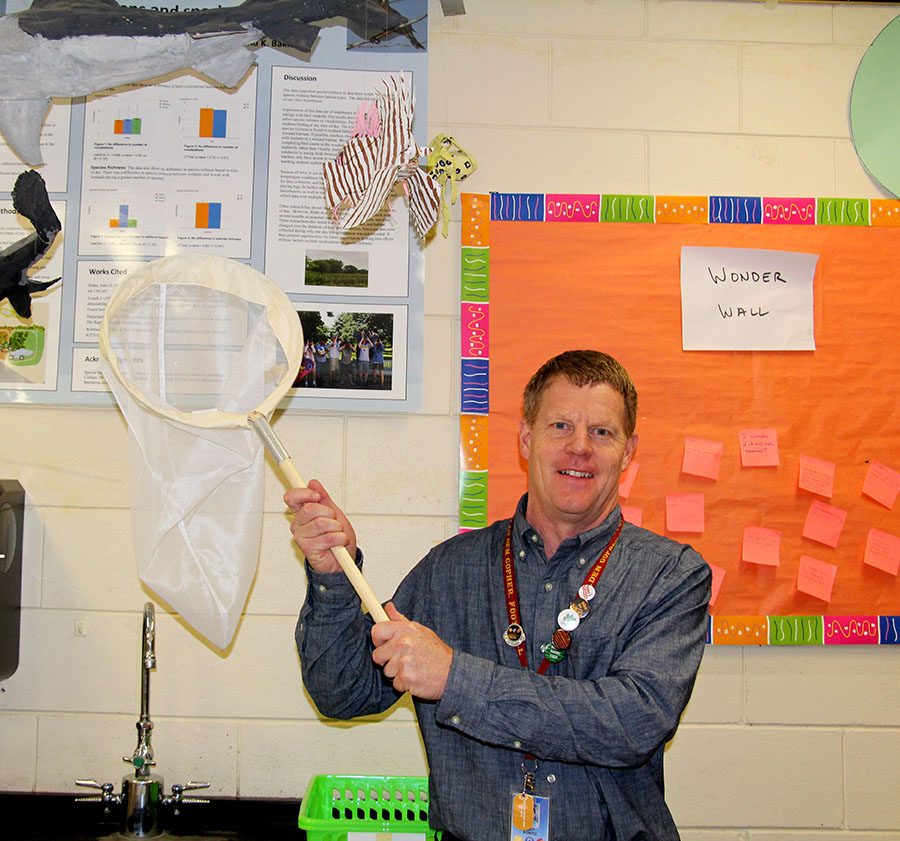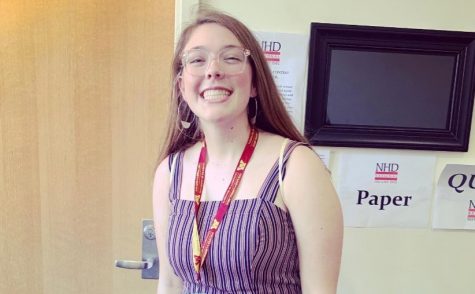Driven To Discover program presents many benefits for South science teachers and students alike
Biology teacher Jeff Ponto proudly displays a butterfly and dragonfly net supplied by the Driven To Discover program. ¨ We’ve written grants, gotten equipment…the kids are out catching dragonflies with nets that came with this program.¨ Photo: Norah Austin
October 9, 2018
Beginning in the summer of 2014, made possible by a grant from the National Science Foundation, a group of 5 South science teachers, Jeff Ponto, Mick Hamilton, Susan Peterson, Randy Hedlund and Katherine Rosok, attended various classes surrounding topics ranging from pollinators to phenology, of which were sponsored by Driven To Discover, an asset of the University Of Minnesota Extension program.
Through attending these classes, significant amounts of grant money, equipment and increased opportunities were brought to South’s science department. “We received both a garden grant, about $1000 per year for 3 years, and $400 each for classroom supplies,” said Peterson.
Each teacher attended the program a different number of years, with the most being Ponto attending each summer for the entirety of the 4 year long program. Each summer, the classes were held in two week sessions, with the first week being held at Gustavus Adolphus college in St.Peter, Minnesota.
“The first week is all about the teachers becoming an expert in the specific area that they’re studying,” said Mick Hamilton, a biology teacher at South. “The teachers learned how to do all of those things… They get to be the students, they get to create a research question and they get to spend an entire day collecting samples, and running through the data.” The second week encompasses the actual application of the data, submittal to databases, and the creation of a cumulative research poster on the area that each group had been studying. “The second week was back at the U of M, St. Paul campus, where we analyzed our data and began working on our research papers,” said Peterson. “The final day was about sharing what we learned with the other groups.”
The program was separated into four groups, each one studying birds, pollinators, phenology and dragonflies. Throughout their days, South teachers were able to create important relationships with other educators from around the state. ¨Each year I get something new out of it,¨ said Hamilton. ¨Whether its learning something new about the things that we’re investigating or just the different connections I make with other teachers outside of South.¨
This, among other things surrounding the classes have many considerable benefits. “Workshops like this are beneficial because working with other passionate educators from around the county re-energizes you,” said physics teacher Randy Hedlund. “I enjoy collaborating with others and bouncing ideas to generate a research project…these workshops help keep me grounded in relating to the student by letting me be the student again, where we experience similar excitement and frustration in grappling with assignments and new knowledge.”
Teachers are able to gain new perspectives on many ideas pertinent to their classroom instruction due to the way this program is structured. ¨The program allows students to engage in meaningful research using their outdoor school environment. Students are able to submit data that is used by scientist beyond our school community,¨ said Peterson.
As well, the program boosts the confidence the teachers have in guiding their students through authentic field science experiences. For some the model of outdoor education that the Driven To Discover program teaches greatly contributes to this sense of confidence. “By modeling outdoor education with us, I feel more confident taking students outside to do authentic learning in an outdoor setting. I use the curriculum in my AP Environmental Science class to start and end the school year,” stated Peterson.
The money supplied by this grant that is allotted to South is often spent on new equipment and hands-on opportunities for students. “The kids are out catching dragonflies with nets that came with this program, using binoculars we’re getting from this program. So I think classes see a lot of equipment that we wouldn’t maybe see otherwise. As well, I think the benefits are that we can go outside and see things, we can show kids things that they may not see normally, they’re there but they just don’t know that they’re there,” said Ponto.
Besides what many feel are the benefits to teachers, the grant money is what has made this program truly successful and beneficial to South students as whole. Those who have participated in the program believe that the grant money is what actually allows South teachers to implement what they have learned over the summer into their classroom. They believe, that through the implementation of this program, students have seen many benefits, ranging from the ability to become a citizen scientist to engaging in meaningful research.
Surrounding this, Peterson stated, “I believe students need to connect with their outdoor community and have an awareness of the environmental issues currently impacting where we live. I wanted to be able to go beyond just making observations outdoors to showing students they can have an impact on research in their community.”






